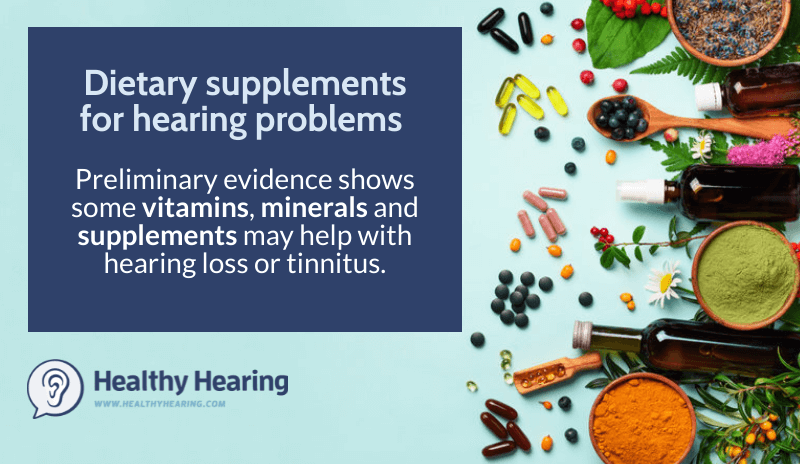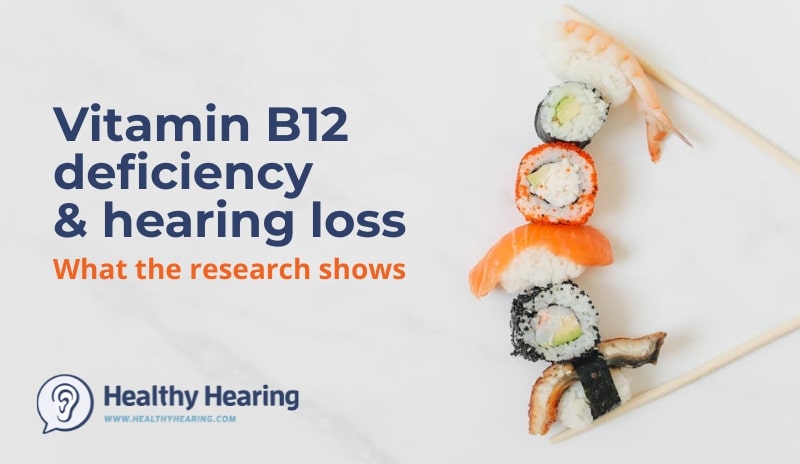|
www.HealthyHearing.com |
Can vitamin B12 deficiency cause hearing loss?Growing body of research indicates there may be a link
Contributed by Patricia Weiser, PharmD Key points:
If you’ve noticed subtle changes in your hearing, like muffled sounds or difficulty following conversations, it’s easy to assume it’s just a sign of aging. But sometimes, a nutrient imbalance could be playing a role. Vitamin B12 is important for keeping your nerves healthy and your body energized. It helps protect the delicate coating around nerve fibers, allowing signals to travel smoothly between the brain and body. When B12 levels drop, symptoms like fatigue, numbness, and brain fog may appear. Growing evidence suggests your hearing could be affected, too. Why your body needs vitamin B12Vitamin B12 (also called cobalamin) is a water-soluble nutrient found mainly in animal-based foods like meat, eggs, fish, and dairy. Symptoms of B12 deficiency vary widely. Symptoms may include:
People with mild deficiency often have no symptoms. Because the body can’t make B12 on its own, you need to get it from food or supplements. Some people don’t absorb it well due to certain conditions, gastrointestinal surgery, or long-term use of medications such as metformin or proton pump inhibitors like omeprazole.
Exploring the connection between vitamin B12 and hearing lossResearchers have long known that vitamin B12 is crucial for nerve health. Since the auditory nerve and structures of the inner ear rely on healthy nerve signaling, it's possible that a B12 deficiency could disrupt how sound is processed. A 2025 systematic review brought this idea into sharper focus by analyzing multiple studies on B12 levels and hearing loss. The review, published in Ear, Nose & Throat Journal, revealed that people with low vitamin B12 levels were more likely to have hearing problems than people with normal or higher levels. The review was conducted by Rohit Ravi, PhD, and colleagues at the Department of Audiology and Speech Language Pathology, Kasturba Medical College Mangalore in India. The review included nine studies involving different age groups. This research and other studies offer several theories to explain why vitamin B12 may affect hearing: B12 and hearing in older adultsAs people age, both hearing ability and vitamin B12 absorption naturally decline. Some researchers believe that B12 deficiency may accelerate age-related hearing loss (ARHL) by worsening nerve degeneration and reducing blood flow to the inner ear. Several of the studies in the review support this theory:
Homocysteine regulationVitamin B12 helps maintain nerve cells and is essential for breaking down homocysteine — an amino acid that, at high levels, can cause inflammation and damage blood vessels and nerves, including those involved in hearing. Vitamin B12 and folate, another B vitamin, help regulate homocysteine. When B12 or folate levels are low, homocysteine can build up, potentially contributing to sensorineural hearing loss (SNHL). Two studies included in the review explored this connection. One found that people with SNHL under age 60 had lower levels of B12 and folate compared to those with normal hearing. Another focused on people with noise-induced hearing loss (NIHL) and found that both B12 and folate levels were significantly lower in affected participants. In these cases, hearing loss typically began at 4000 Hz and peaked at 6000 Hz—frequencies often impacted by early nerve damage. Low B12 may affect auditory developmentIn kids, B12 deficiency may interfere with the development of the auditory system, which depends on proper nerve growth and myelin formation. When this process is disrupted, it could lead to lasting effects on hearing. One study in the review observed that mild hearing loss was more common among school-aged children with B12 deficiency than among their peers. B12 and noise exposureNoise exposure is a known risk factor for hearing loss, and recent findings suggest that B12 deficiency might make the ears even more vulnerable to damage from loud sounds. This could be due to impaired nerve repair or increased oxidative stress when B12 is low. One study, included in the review, looked at men with noise-induced hearing loss (NIHL) and found significantly lower B12 levels compared to those without hearing loss. Another study involving military personnel exposed to loud environments found that nearly half of those with NIHL and tinnitus were B12 deficient. After receiving B12 supplements, many reported improvements in tinnitus symptoms and better hearing in noisy settings, suggesting possible therapeutic benefits. Who’s most at risk for low B12 and hearing changes?Many people get enough B12 through their diet. But if you're experiencing unusual fatigue, hearing changes, or nerve symptoms, it’s understandable to feel concerned or confused. You're not alone, and getting your B12 checked is a smart, simple step toward clarity. According to the National Institutes of Health, people at highest risk for low vitamin B12 include:
Even without full-blown deficiency, borderline B12 levels may affect nerve health and hearing. That’s why researchers are calling for earlier testing and intervention. Can vitamin B12 help treat tinnitus?Tinnitus, often described as a ringing or buzzing in the ears, affects millions of adults, sometimes alongside hearing loss. A 2016 study in India explored whether B12 supplementation could help. The study involved 40 people with chronic subjective tinnitus. Half received weekly B12 injections for six weeks, and the other half received a placebo. Among those with a documented B12 deficiency, the treatment group reported improved tinnitus severity scores. However, those without a deficiency didn’t benefit. Though a small study, it strengthens the theory that correcting a B12 deficiency could help relieve tinnitus in some people. What to do if you’re concerned about low B12If you suspect your B12 might be low, especially if you're experiencing hearing changes, talk with your healthcare provider. A simple blood test can measure your B12 level, and additional tests like methylmalonic acid or homocysteine can help confirm borderline cases. Treatments for B12 deficiency typically include dietary changes along with either:
The surprising role of nutrients in hearing health
Besides vitamin B12, other vitamins and minerals support hearing health, such as:
The best way to get all the vitamins your body needs is by eating a balanced mix of fruits, vegetables, whole grains, dairy, and beans. Supplements can help fill in the gaps, especially if you have certain health conditions. Be sure to follow the labeled dosage guidelines and avoid taking too much, particularly of fat-soluble vitamins like A, D, E, and K, which can build up in the body and cause harm. Bottom lineVitamin B12 may not be the first thing that comes to mind when thinking about hearing loss, but it could be a silent contributor. Growing evidence suggests that B12 deficiency may be associated with hearing loss and possibly tinnitus, especially in older adults. If you're dealing with unexplained hearing loss or nerve-related symptoms, it can feel frustrating or even a little scary. The good news is that vitamin B12 levels are easy to measure, and deficiency is usually treatable. While it’s not a cure-all, keeping your B12 in a healthy range is a powerful way to support your hearing and your overall well-being. If you’re experiencing hearing problems, a hearing care professional near you can help. |
Featured clinics near me
Earzlink Hearing Care - Reynoldsburg
7668 Slate Ridge Blvd
Reynoldsburg, OH 43068

Find a clinic
Need a hearing test but not sure which clinic to choose?
Call 1-877-872-7165 for help setting up a hearing test appointment.


